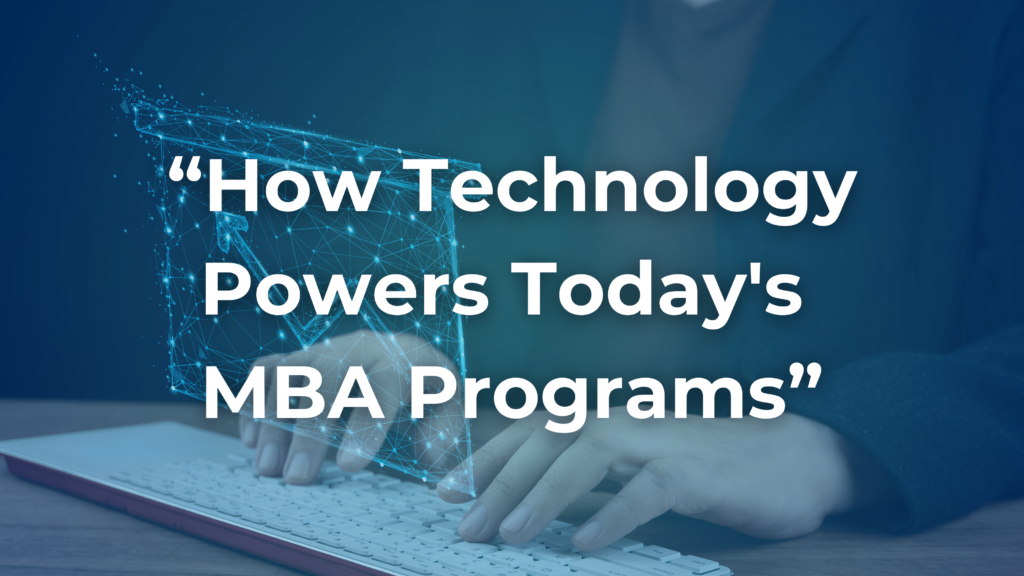In today’s rapidly evolving educational landscape, technology plays a pivotal role in shaping the way MBA programs are designed and delivered. For working professionals in India, advancements in technology have made it easier than ever to pursue an MBA while balancing job responsibilities. From interactive learning platforms to AI-powered personalization, technology has transformed modern MBA programs into flexible, accessible, and engaging experiences.
This post explores the key technological innovations that are redefining MBA education in India, making it a practical choice for ambitious professionals aiming to advance their careers.
1. Learning Management Systems (LMS): The Backbone of Online MBAs
At the core of every modern online MBA program is a robust Learning Management System (LMS). These platforms serve as the digital hub for coursework, lectures, assignments, and interactions with faculty and peers.
Features of Advanced LMS Platforms
- Interactive Dashboards: Allow students to track progress, access learning materials, and view schedules.
- Live and Recorded Lectures: Students can attend live sessions or watch recorded lectures, providing flexibility to learn at their own pace.
- Discussion Forums: Facilitate peer-to-peer learning and engagement, allowing students to discuss topics and share insights.
- Mobile Accessibility: Many LMS platforms are mobile-friendly, enabling students to study on the go using their smartphones.
LMS Platforms Used in India
Leading Indian institutions, including IIMs and NMIMS, utilize platforms like Moodle, Canvas, and proprietary LMS solutions to create seamless learning experiences. These systems are tailored to meet the unique needs of Indian students, such as offering bilingual content or catering to bandwidth limitations in remote areas.
2. Artificial Intelligence (AI) in MBA Education
AI is revolutionizing MBA education by creating personalized learning experiences and improving outcomes for students. Indian MBA programs are increasingly adopting AI-driven tools to enhance the educational journey.
Personalized Learning Paths
AI analyzes student data to recommend tailored learning paths based on strengths, weaknesses, and career goals. For instance, if a student excels in marketing but struggles with financial modeling, the system can suggest additional resources and tutorials to improve their performance.
Real-Time Feedback
AI-powered platforms provide instant feedback on assignments, quizzes, and projects, helping students identify areas for improvement. This immediate response allows professionals to address knowledge gaps without waiting for traditional grading cycles.
Career Guidance and Mentorship
AI tools are also being used to assist students with career planning. For example, AI can analyze job market trends and suggest courses or specializations that align with high-demand skills in India’s industries, such as data analytics, e-commerce, and fintech.
3. Virtual Classrooms: Enhancing Interaction and Engagement
Virtual classrooms bring the traditional MBA experience online, enabling real-time interaction between students and faculty. These digital environments simulate a classroom setting, fostering collaboration and active learning.
Key Features of Virtual Classrooms
- Live Lectures: Faculty can deliver lectures in real-time, allowing students to ask questions and participate in discussions.
- Breakout Rooms: Smaller groups can collaborate on projects and case studies, mirroring in-person group work.
- Interactive Tools: Tools like polls, quizzes, and chat functions keep students engaged during sessions.
The Indian Context
With platforms like Zoom, Microsoft Teams, and Google Meet becoming commonplace, virtual classrooms are now accessible to students across India, even in smaller towns and cities. Institutions often schedule live sessions during evenings or weekends to accommodate working professionals.
4. Mobile Learning: Education on the Go
In India, where mobile penetration is high, mobile learning has become a cornerstone of online education. MBA programs are increasingly optimized for smartphones, making it convenient for professionals to study anytime, anywhere.
Benefits of Mobile Learning
- Flexibility: Access course materials, recorded lectures, and quizzes during commutes or lunch breaks.
- Offline Access: Many programs allow students to download materials for offline use, catering to those with limited internet connectivity.
- Apps for Seamless Learning: Platforms like Moodle and Canvas offer mobile apps that ensure a smooth, user-friendly experience.
Popular Use Cases
Professionals in metropolitan cities like Mumbai and Bengaluru often use mobile learning to optimize their downtime during long commutes, while those in rural areas benefit from the ability to access quality education without needing a desktop setup.
5. Data Analytics in MBA Programs
Data analytics is a game-changer in MBA education, providing insights that benefit both students and institutions. By leveraging data, MBA programs can deliver better outcomes and enhance the overall learning experience.
For Students
- Progress Tracking: Students can monitor their performance through dashboards that highlight completed assignments, grades, and participation levels.
- Targeted Support: Analytics identify areas where students need extra help, enabling institutions to offer personalized support.
For Institutions
- Curriculum Optimization: Data analytics help universities understand which courses are most effective and identify gaps in the curriculum.
- Student Success Rates: Institutions can track retention and success rates, making adjustments to improve outcomes.
Relevance in India
In India, where diversity among students is vast, data analytics ensures that programs cater to the varying needs of urban and rural learners, first-time MBA seekers, and experienced professionals.
6. Gamification in Learning: Making Education Engaging
Gamification is an emerging trend in MBA programs that uses game-based elements to make learning more interactive and enjoyable. This approach is particularly appealing to younger professionals who value engaging and dynamic education.
Gamified Elements
- Quizzes and Leaderboards: Encourage healthy competition among students.
- Simulations: Replicate real-world business scenarios, allowing students to practice decision-making in a risk-free environment.
- Rewards and Badges: Recognize milestones, motivating students to stay engaged.
Indian MBA Programs and Gamification
Institutions like Amity and Symbiosis are incorporating gamification into their online MBAs, particularly in courses like marketing and operations, where practical application is key.
7. The Future of Technology in MBA Education
As technology continues to evolve, the future of MBA education in India looks promising. Here are some trends that are likely to shape the next generation of MBA programs:
Virtual Reality (VR) and Augmented Reality (AR)
VR and AR can create immersive learning experiences, such as virtual company tours, role-playing exercises, and interactive case studies. These technologies are particularly useful for leadership and management training.
Blockchain for Credential Verification
Blockchain technology ensures secure and tamper-proof digital credentials, making it easier for students to share verified degrees and certificates with employers.
AI-Driven Mentorship
Future advancements in AI will allow for more sophisticated mentorship, with virtual advisors providing tailored guidance based on real-time data.
Technology has revolutionized the way MBA programs are delivered, making them more accessible, engaging, and relevant for modern professionals. In India, where the demand for flexible education is high, innovations like LMS platforms, AI-driven personalization, mobile learning, and gamification are empowering working professionals to pursue MBAs without compromising their careers.
As institutions continue to adopt cutting-edge tools and technologies, MBA programs will only become more dynamic and impactful. Whether you’re looking to upskill, transition to a new role, or enhance your leadership abilities, technology-driven MBA programs offer the perfect blend of flexibility, accessibility, and quality education.
If you’re ready to take the next step in your career, consider an online MBA program that leverages these advancements to deliver a world-class learning experience.

